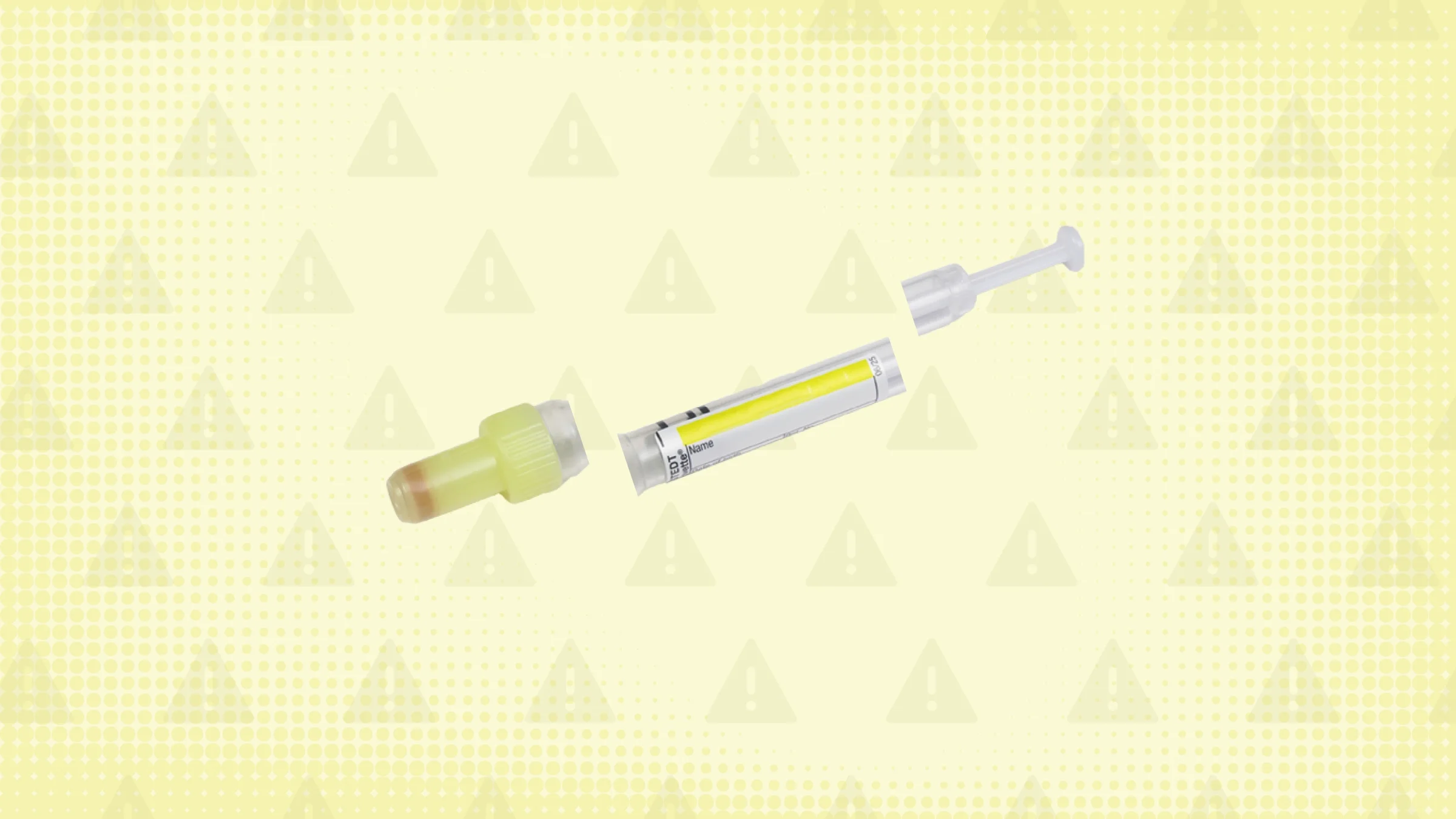Key takeaways:
Eligard (leuprolide) is an antiandrogen medication used to treat advanced prostate cancer. The most common Eligard side effects are injection site reactions, hot flashes, and fatigue.
Enlarged breasts, testicular atrophy, and decreased sex drive are also possible. These side effects happen because Eligard lowers testosterone levels.
Eligard may cause a tumor flare-up when you first start receiving the medication. This makes symptoms worse before they get better.
Save on related medications
Eligard (leuprolide) is an injectable medication that treats advanced prostate cancer. It’s an antiandrogen medication that works by lowering your testosterone levels. Eligard is similar to other forms of leuprolide that treat prostate cancer, such as Lupron Depot and Camcevi.
Testosterone helps certain types of prostate cancer grow and spread. So reducing testosterone levels can help treat prostate cancer. But it can also lead to side effects. Being aware of the possible Eligard side effects and how to manage them can help you get the most from your medication.
Eligard side effects at a glance
Below are lists of common and rare Eligard side effects reported during clinical trials. Keep in mind that this doesn’t include all possible side effects. Talk to your healthcare team about any side effects you experience during Eligard treatment, even if they aren’t listed here.
Common Eligard side effects include:
Injection site reactions
Tumor flare (during the first week of treatment)
Hot flashes
Fatigue
Joint or muscle pain
Dizziness
Nausea
Enlarged breasts
Reduced testicle size
Lower sex drive
Night sweats
Clammy skin
Rare but serious Eligard side effects include:
Increased risk of developing diabetes
Increased risk of heart problems
Bone loss
Increased risk of seizures
Pituitary apoplexy (sudden death of the pituitary gland)
Let’s look more closely at eight of these side effects and how to manage them.
1. Hot flashes
Hot flashes are the most common Eligard side effect. Many people associate hot flashes with menopause. But since Eligard lowers testosterone levels, it can cause similar symptoms during prostate cancer treatment.
Hot flash symptoms can include a sudden feeling of warmth in your face and chest. You may also start sweating or feel shaky and anxious. When hot flashes happen while you’re asleep, they’re also referred to as night sweats.
Hot flash symptoms are typically mild during Eligard treatment. Wearing loose-fitting clothing and increasing your fruit and veggie intake may help manage hot flashes. Regular exercise can also help if that’s an option for you. If hot flashes become bothersome, talk to your prescriber. They may be able to prescribe a medication, such as gabapentin (Neurontin), to help.
Good to know: Avoid trying over-the-counter (OTC) supplements marketed for hot flashes. They may increase hormone levels in a way that can interfere with your cancer treatment. Check with your prescriber about what options may be safe for you.
2. Injection site reactions
Injection site reactions are another possible Eligard side effect. These include symptoms such as burning, pain, and redness in the area where Eligard is injected. Bruising and itching are also possible.
Most injection site reactions are mild and go away soon after the injection or within a few days. A warm compress or ice pack can provide relief in the meantime. If needed, OTC pain relievers such as acetaminophen (Tylenol) or ibuprofen (Advil) can also help. Just check with your healthcare team first, as these medications aren’t the right choice for everyone.
Eligard vs. Lupron Depot: Learn about the differences between these two leuprolide-based medications.
Bone loss from prostate cancer treatment? Here are the medications most commonly prescribed for bone loss caused by androgen deprivation therapy.
Signs of prostate cancer: Knowing what signs and symptoms to look for can help you detect and treat prostate cancer sooner.
3. Fatigue
Fatigue is another side effect that can happen with Eligard. But it’s also a common symptom of prostate cancer. So it may be hard to determine the actual cause.
Getting plenty of sleep and eating a healthy diet can help keep your energy levels up. If you’re able, exercising can also give you an energy boost. Even a short walk can make a difference. If you’re too weak or tired to perform daily activities, let your healthcare team know. They can make sure there isn’t another cause, such as low blood cell counts. They can also recommend appropriate treatment.
4. Dizziness
Dizziness is a possible Eligard side effect, but it isn’t very common. If you start feeling dizzy, find a safe place to sit or lie down until the feeling passes. Move slowly and use support if needed to avoid falls.
As with other Eligard side effects, staying hydrated and eating regular meals can help prevent dizziness. But if it worsens or is interfering with your daily activities, let your prescriber know.
5. Physical and sexual changes
Various physical and sexual side effects can happen during Eligard treatment. They’re all related to the lower testosterone levels caused by the medication.
Decreased sex drive is a common side effect of Eligard and other antiandrogen therapies. It can also cause your testicles to become smaller and make ejaculation more difficult.
Eligard can also cause enlarged breasts (gynecomastia). This isn’t a common side effect, but it’s more likely with higher doses of Eligard (30 mg or more).
In most cases, these side effects resolve once you stop Eligard treatment. In the meantime, talk to your prescriber if any of the effects become bothersome. There may be treatment options to help improve your symptoms.
6. Worsening prostate cancer symptoms
When you first start Eligard, your prostate cancer symptoms may worsen before they start to improve. This is known as a “testosterone flare.” It typically happens during the first few weeks of treatment.
A testosterone flare happens because Eligard can increase testosterone levels before they start to go down. Since testosterone can stimulate prostate cancer, your tumor may temporarily get bigger before it starts to shrink. This can cause or worsen symptoms such as bone or nerve pain, trouble peeing, or blood in the urine.
In most cases, these symptoms will resolve once testosterone levels start to drop. But in rare cases, a testosterone flare can cause serious side effects. For example, if you have a tumor near your backbone, then a flare may lead to pressure on your spine that makes it hard to move normally. Or it can enlarge your prostate further and block urine from flowing from your bladder.
In some cases, your prescriber may suggest a medication such as bicalutamide (Casodex) to help prevent a testosterone flare. They’ll let you know what to expect when starting Eligard based on your specific situation.
7. Increased blood glucose
Eligard may increase your blood glucose (sugar). That puts you at a higher risk of developing new or worsening diabetes. In most cases, this can be managed through diet and medications if needed until your Eligard treatment is finished.
Your prescriber will likely keep an eye on your blood glucose levels to watch for this side effect. But let them know if signs and symptoms of high blood glucose appear, such as peeing more often, increased thirst, and unexplained weight loss.
8. Bone loss
Eligard can make your bones weaker over time. This increases your risk of osteoporosis and broken bones. The risk of bone loss goes up the longer you’re receiving Eligard.
It’s a good idea to take steps in your home to help prevent falls, which raise your risk of bone fractures. This includes installing handrails, securing area rugs, and using nonslip bathroom mats. Your prescriber may also recommend a prescription treatment, such as Prolia (denosumab), to help prevent bone loss while receiving Eligard.
Does Eligard affect your heart?
Possibly. There have been reports of people experiencing a heart attack or stroke while taking antiandrogen medications, such as Eligard. There’s also an increased risk for long QT syndrome, a type of irregular heartbeat.
The risk for these side effects seems to be very low overall. But it may be higher if you’re living with a heart condition or are taking other medications that may cause long QT syndrome. Be sure to let your prescriber know your full medical history and give them your medication list before starting Eligard. They can help make sure it’s a safe treatment option for you.
The bottom line
Eligard (leuprolide) is an injectable antiandrogen medication that treats advanced prostate cancer. The most common Eligard side effects include hot flashes, injection site reactions, and fatigue. Dizziness, enlarged breasts, and decreased sex drive are also possible. Your prostate cancer symptoms may worsen when you first start receiving Eligard, but this should resolve after a few weeks.
Rare but serious Eligard side effects include increased blood sugar, bone loss, and heart problems. If side effects are interfering with your daily life or worsen, contact your prescriber.

Why trust our experts?



References
Abbvie. (2024). Lupron Depot- leuprolide acetate [package insert].
Accord BioPharma. (2023). Camcevi- leuprolide injection, emulsion [package insert].
American Cancer Society. (2024). Hot flashes and sweating.
Bach, C. (2024). Leuprolide acetate (Lupron, Lupron Depot, Eligard, Prostap, Viadur) - for men. OncoLink.
Del Valle, M. M., et al. (2023). Pituitary apoplexy. StatPearls.
Hussein, A., et al. (2020). Bone health effects of androgen-deprivation therapy and androgen receptor inhibitors in patients with nonmetastatic castration-resistant prostate cancer. Prostate Cancer and Prostatic Diseases.
Lugo, T., et al. (2022). Hot flashes. StatPearls.
National Cancer Institute. (2024). Cancer fatigue.
National Cancer Institute. (2024). Hormone therapy for prostate cancer.
Ross, R. W., et al. (2002). Osteoporosis in men treated with androgen deprivation therapy for prostate cancer. The Journal of Urology.
Schover, S. R. (2015). Sexual healing in patients with prostate cancer on hormone therapy. American Society of Clinical Oncology Educational Book. ASCO Publications.
Shah, S., et al. (2024). Bothersome hot flashes following neoadjuvant androgen deprivation therapy and stereotactic body radiotherapy for localized prostate cancer. Cureus.
Tolmar. (2024). Eligard- leuprolide acetate injection, suspension, extended release [package insert].









